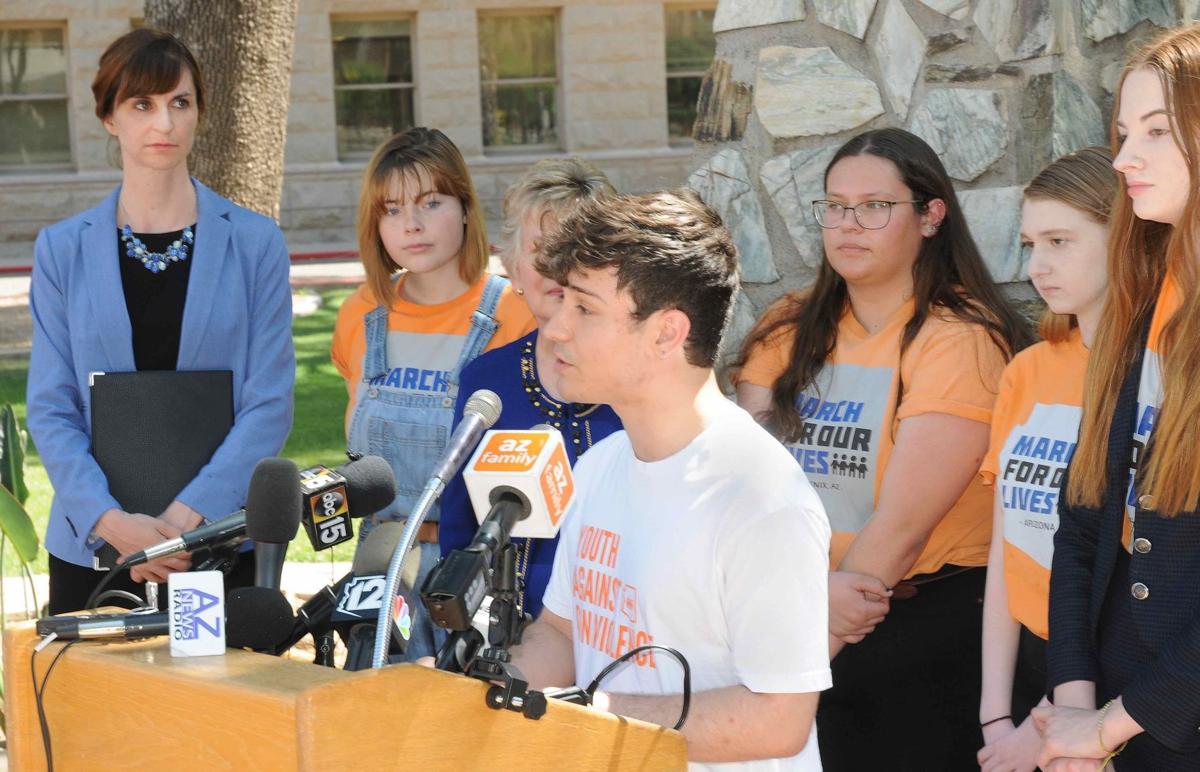PHOENIX т A student-led group that tried to get lawmakers to enact gun control last year is refocusing on something more attainable.
Jordan Harb, a leader of the March for Our Lives movement, said Monday his organization remains convinced that УлшжжБВЅ needs to crack down both on who has access to firearms as well as dealing with the kind of guns that can fire off many rounds.
тI wouldnтt say that we have softened but rather changed our focus on something thatтs actually able to be done,т he said. And Harb, a Mesa high school student, said the gun-control measures his group pushed last year т measures the Republican-controlled Legislature did not enact т are тstill on our policy agenda.т
What that leaves for the moment are specific and he believes immediate needs, like the lack of guidance counselors and social workers on campus as well as dealing with issues of bullying and abuse.
People are also reading…
Harbтs comments came as Kathy Hoffman, the state superintendent of public instruction, announced she was creating a School Safety Task Force to come up with ideas to keep students safer.
The plan is modeled on legislation crafted by Sen. Kate Brophy McGee, R-Phoenix, and Rep. Daniel Hernandez, D-УлшжжБВЅ, which would have directed both Hoffmanтs agency and school boards to come up with plans to deal with students with mental health problems who may be at risk of killing or injuring their classmates.
McGeeтs bill got out of the Senate but was never heard in the House; the Hernandez version cleared two House committees only to be quashed when Rep. Anthony Kern, R-Glendale, refused to hear it in the House Rules Committee that he chairs.
Hoffman figures she has the power to bring together diverse interests, with or without legislative authorization, to at least determine what are the problems and the needs and ways that school boards can adopt policies to prevent violence.
Brophy McGee said some of that can be addressed with school design, things like limiting the number of entrances where strangers can get onto campus or into a building.
тBut today, more than ever, beyond brick-and-mortar decisions, there are other factors, things that canтt be seen at first glance but can be felt when one walks onto a school campus,т she said.
тItтs the school culture that must be built with as much care as the school itself,т Brophy McGee continued. тHow do we build a positive school culture that strongly deals with such issues as bullying and cyberbullying?т
Brophy McGee said she supports the decision of the students to refocus their efforts on something other than guns and access to them.
тAt the end of the day, the problem is mental health, whether the weapon chosen is a gun, a knife or something else,т she said.
Harb agreed that looking at issues of building design and even putting more police on campus ignores ways of preventing violence in the first place.
тOften the threat is not outside the school gates but in the classroom, sitting next to me,т he said. And then thereтs the issue of teens who take their own lives.
тArmed guards can sometimes be useful when the first shots are fired,т Harb said. тBut we often forget that counselors and support systems and other preventative measures to keep violence from happening in the first place.т
That question of the lack of counselors got increased attention earlier this month with a report by the American School Counselor Association that, on average, there is one counselor for every 905 students in УлшжжБВЅ public schools. Thatтs nearly twice the national average.
Gov. Doug Ducey has proposed funding for an additional 224 counselors to be hired during the next two years. That, however, would bring it down to just one counselor for every 766 students.
Still, Brophy McGee said her colleagues cannot ignore the fact that the incidents on campuses across the nation involve guns.
тAt the end of the day weтve got to figure out how to keep guns out of the hands of mentally unstable people, whether theyтre students or whether there were adults,т she said.
Last year Ducey proposed allowing judges to issue orders to take guns from people considered dangerous.
The Senate approved it, but only after removing a provision to allow family members, guidance counselors and school administrators to refer to courts the people they consider dangerous to themselves or others.
Even with that change the measure could not get a hearing in the House.
Ducey made a new plea for his plan this year but could not even get it introduced into legislation.
On Twitter: @azcapmedia















